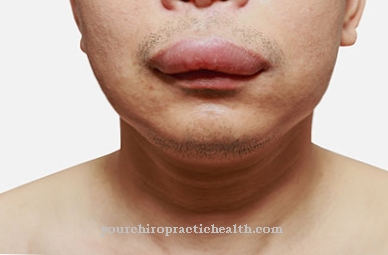From one allergy one speaks when the immune system of the body reacts extremely strongly to certain substances and environmental influences. One speaks here of an overreaction. Typical allergies are hay fever, house dust allergies and sun allergies. The signs of most allergies are usually clearly visible. Colds, watery eyes, swellings, itching and shortness of breath are not uncommon and should be examined by a doctor.
What are allergies?

An allergy is basically nothing more than the result of an overzealous immune system. Usually, the immune system is used to fight off pathogens and pests in order to protect the body.
In some people, however, harmless intruders, such as components of food or bee pollen, are classified as harmful, so that the body reacts allergically to the respective foreigners.
An allergy can not only be to pollen or certain foods, house dust, components of cosmetics, animal hair or other things that one comes into contact with in everyday life can also lead to an over-sensitive reaction. Since there are many triggers for an allergy, both children and the elderly can be affected.
causes
Why some people develop an allergy has not yet been fully clarified, because there are many causes that can trigger allergic reactions. Basically, the immune system considers an actually harmless foreign body to be harmful and fends it off, so that the body reacts with skin irritations, watery eyes and similar symptoms.
The reasons for hypersensitivity in some people are many. For example, the tendency to allergies can be inherited through genes. If you have several allergy sufferers in your family, you will likely be more sensitive to certain substances yourself.
The fact that allergies occur much more frequently in industrialized countries than in other countries also suggests that the body needs a certain amount of dirt and germs to develop its defenses. If you place too much emphasis on hygiene and keep your apartment sterile, you are rarely protected against the pollutants from the environment, which you cannot avoid.
For this reason, small children and babies should not be cleaned too sterile. However, they should not come into contact with dirt and vermin. The healthy mediocrity is still the most natural thing to prevent later allergies.
Symptoms, ailments & signs
An allergy can be accompanied by visible as well as hidden symptoms and signs. The most common and well-known signs are reddened and very itchy areas of the skin, which can also be swollen. These often arise from direct contact allergies and occur exactly where the allergen comes into contact with the body.
If the itching becomes too severe, many sufferers scratch themselves until open areas of skin and wounds appear. Likewise typical symptoms of allergies are irritated and swollen mucous membranes, for example around the eyes, mouth and throat.
However, allergies can also manifest themselves in severe shortness of breath, preferably if the allergenic substance has been inhaled or consumed. Symptoms such as dizziness, palpitations, and rapidly rising blood pressure can also indicate an allergy and the onset of anaphylactic shock.
Especially in connection with food allergies and food intolerances, the gastrointestinal tract can also be affected by the symptoms caused by the allergy. Digestive problems can occur to a greater or lesser extent, ranging from nausea and vomiting to mild or even very severe diarrhea.
Circulatory problems are usually the result. If the allergic reaction is milder, the digestive system can delay the reaction for up to 24 hours.
course

The course of an allergy depends primarily on the allergens to which the patient is over-sensitive. The eyes, which react with redness and itching, are often affected. Conjunctivitis and strong tear production are also not uncommon with an allergy. In addition, there is often swelling of the conjunctiva and eyelids.
However, allergic reactions can also affect the bronchi. In contrast to reactions in the eyes, these effects can also cause permanent damage and are therefore classified as more dangerous. In the case of hypersensitivity, the bronchi narrow while too much bronchial secretion is produced at the same time, causing inflammation. As a result, the bronchial mucosa can be damaged.
An allergy can also lead to breathing problems if the nose is affected. The nasal mucous membranes swell while too much secretion is produced at the same time. The consequences of an allergy are severe itching, increased sneezing and, in the worst case, inflammation in the sinuses.
Complications
An allergy leads to characteristic symptoms that lead to corresponding complications. First of all, almost any substance can be sensitized, so that it can hardly be allergic to anything. In the case of frequent contact with the allergen, this can lead to severe impairment of the quality of life.
In some cases, an allergen can cause Quincke's edema. This leads to swelling, especially in the deeper layers of the skin, which is more serious. This mainly leads to swelling of the genitals, hands, feet and face. On the face, this can lead to severe swelling in the airways, which can lead to severe shortness of breath and the threat of suffocation.
It also constricts the esophagus, which can lead to difficulty swallowing. In the worst cases, an allergic reaction leads to anaphylactic shock. This leads to a sharp drop in blood pressure in the person concerned and important organs are no longer supplied with enough blood, whereupon they can die and lose their function.
This condition is life-threatening and should be monitored by an emergency medical officer. Furthermore, so-called cross-reactions can occur, in which substances that look molecularly similar to the allergen can also trigger an allergic reaction and cause the same complications as the original allergen.
When should you go to the doctor?
Allergies have mild and severe courses, but regardless of the severity of the first symptoms, a medical diagnosis is important. Noticeable swelling and redness, wheals on the skin, watery eyes and shortness of breath in severe allergic reactions are typical of an allergy and should be examined. In the case of some allergies, the cause is obvious to the person concerned, because the presumed allergic reaction always occurs in the same situation - for example when eating nuts or other foods.
In this case, at the first visit to the doctor, the patient should express a suspicion that they have an allergy. A visit to the doctor is also useful if allergic symptoms occur without a clearly identifiable cause, because then it could be pollen or other environmental influences in the air. Allergy sufferers with a known diagnosis should pay attention to the severity of their symptoms.
If they become more severe and this is not a one-off exception, those affected should make another doctor's appointment. Allergies can get worse - in this case the patient should know what to do in the event of a severe allergic reaction. It is also important to visit the doctor again if an allergy sufferer has a reaction to a substance that has not previously caused any problems. New allergies can also occur and should be recognized in good time.
Doctors & therapists in your area
Treatment & Therapy
A real cure for all allergies is not yet possible. In many cases, however, it is sufficient if the person concerned avoids the respective allergens so that he does not react to them.
However, if this is not possible, additional measures must be taken depending on the severity of the allergy. For example, there are drugs that can relieve symptoms. But aids, such as special filters or bed linen suitable for allergy sufferers, can also be useful.
In some cases, sensitization to the substances that trigger the allergy can lead to the symptoms becoming significantly weaker.
Outlook & forecast
An allergy can significantly limit the patient's life and everyday life. The patients suffer from severe shortness of breath and usually also from a runny nose. Furthermore, watery eyes and itching often occur, which can occur all over the body. In some cases, diarrhea or vomiting occurs. An increased heartbeat can also occur.
The severity of the symptoms is different for each person, so that generally no general course of the disease can be predicted in the case of an allergy. However, the quality of life of the patient is significantly reduced by the allergy. Special complications or even life-threatening conditions usually only occur if the person concerned is exposed to the allergy triggers over a longer period of time.
The life expectancy of the patient can also be restricted. The symptoms can be alleviated with medication. The patient must also avoid the allergens so that the symptoms do not arise in the first place.
Aftercare
In general, it cannot be predicted whether there are options for follow-up care available to those affected by an allergy. As a rule, these options depend very much on the exact severity and type of allergy, so that no general prediction can be made here. As a rule, however, the options are limited.
In the case of an allergy, those affected should primarily avoid the triggering substance in order to alleviate the symptoms. You should also refrain from strenuous activities that are strenuous and overwhelming for the body. In some cases, the allergy can also be treated with medication, so you should ensure that you take these medications regularly.
Possible interactions should also be discussed with a doctor. In most cases, the life expectancy of the patient is not negatively affected by an allergy. However, if there is a shock or a severe attack, you can go to the hospital directly or call the emergency doctor. Affected people may have to change their habits or diet in order to avoid the substances triggering the allergy. This is the only way to avoid further complications.
You can do that yourself
Pollen typically flies during a certain time of the year. However, the exact time of the pollen flight depends not only on the type of plant, but also on the weather. The pollen forecast on the radio or television therefore provides current information. Anyone who suffers from hay fever should spend little time outdoors during the critical phase.In addition, it makes sense to avoid activities in the fresh air that are physically demanding.
A food allergy makes it necessary to read the ingredient list of packaged foods carefully. Selected allergens can be read on the list of ingredients in Germany even if they could only occur in traces in the product. These include, for example, peanuts in food. If you are abroad, allergy sufferers must find out whether they are labeled accordingly.
Self-help groups for allergy sufferers are often aimed at people who have to accept severe restrictions in their life or who suffer from their allergies for other reasons. Those affected exchange experiences in such a group and experience understanding and support from other members.
Allergy sufferers should not intentionally expose themselves to the substance to which they are allergic. There may be a risk of allergic shock or other severe reaction. In the event of a possible treatment, allergy sufferers should instead always follow the advice of an experienced doctor and not undertake any corresponding attempts on their own.


.jpg)


.jpg)





















